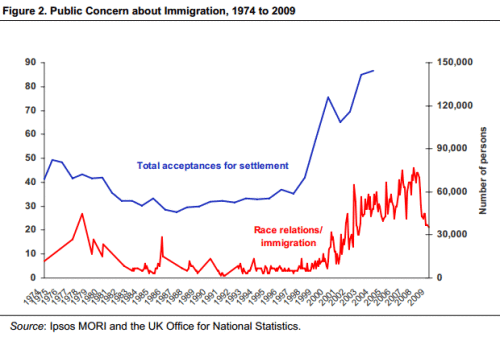In a manner of weeks, I’ve found myself in the odd position of agreeing with Margaret Hodge and Nigel Farage on the issue of immigration. This says less about my views, which haven’t changed for years, but more about how the debate is shifting.
In an interview with the Financial Times in December, Margaret Hodge said :
“Migration is a feature of globalisation. You can’t stop it; so every time a political party says it is going to be tough on immigration, it fails to deliver and loses trust.”
This is striking coming from an arch-Blairite who was frequently criticised for ‘talking tough’ on immigration in the past. Meanwhile, in an interview last week, Nigel Farage said:
“…I’d rather we had communities that were united and where young unemployed British people had a realistic chance of getting a job. I think the social side of [immigration] matters more than pure market economics.”
Of course, I utterly disagree with his broader point, but Farage is right that the social side of immigration matters more than the economics. But here is where Labour and the Left got it wrong.
Unconvincing: Labour and the Left
Here’s an extraordinary fact: the Conservatives were 30 points ahead of Labour in May 2010 as the party best able to handle immigration, while New Labour was busy “talking tough” on the subject.
Labour ministers thought they could neutralise that public distrust by talking tough but the public failed to believe them. They spoke but Britons didn’t bother listening. As Jon Cruddas later put it:
“No language, no warmth no kindness; no generosity, vitality nor optimism. No compassion. If you seek to outflank the coalition from the right, you will turn Labour into a byword for intolerance.”
But when it comes to convincing on immigration, the Left has become just as impotent as New Labour – while being utterly at odds with the public. You can’t convince someone you have contempt for, refuse to listen to, or dismiss the idea they may have legitimate concerns. It’s that straightforward.
Worse, many compound the problem by offering solutions that won’t work. For one, there is the heroic belief that people would think differently if they were told the facts. No, they will just ignore them. Second, there is the view that politicians can challenge public opinion, usually from people who also view politicians with intense cynicism. Again, changing minds on immigration is a lot harder in reality than in theory. As a test, try changing someone’s mind who is utterly at odds with you. And do it entirely via Twitter (politicians don’t get to meet everyone and debate them for hours either). Yes, it is that frustrating and ineffectual.
The press has had some impact, but this is easily over-stated. British attitudes have largely moved in the opposite direction of coverage of global warming, wind farms, homophobia and even racism. Yes, New Labour’s hardening rhetoric shifted the debate rightwards, but it’s difficult to argue it wouldn’t have shifted otherwise.
Instead, people’s attitudes shifted along the numbers, as this chart clearly shows. Source.
Where now?
Another extraordinary fact: from a 30 point lead, the Tories are now merely 8 points ahead of Labour on the party best able to handle immigration. The government’s lead has eroded not because of anything Labour has said (the decline is steady and uncorrelated to speeches), but because Tories themselves pretended they could get a handle on immigration despite being part of the EU and a globalised economy. They created a monster they can’t control.
But what should Labour say? Here are some starting points.
First, we have to say we understand people think immigration has gone beyond levels they feel comfortable with. Accepting this basic reality isn’t pandering to the right but a starting point for a conversation where voters at least feel Labour ‘get’ them.
Second, while the reason why different segments of people feel concerned about immigration are varied, but can be broken down roughly into two: economic and social/cultural concerns. Ed Miliband is doing well to address economic concerns on immigration (regardless of whether the concern is warranted – they are good reforms), but Labour has to have an answer to both.
Third, the party has to remain authentic to its (relatively) liberal roots on immigration, and stop using the technocratic language of ‘transitional controls’ and economic studies. The Tory slide on immigration illustrates that voters just want a bit of honesty and straight talk.
Fourth, Labour has to start focusing on the social impact of immigration too, and come up with a bold and progressive story to tell.
The longer Britons are in contact with immigrants, the more tolerant they become. Racism hasn’t gone away but there’s also far less of it around now than just a few decades ago. There is, therefore, plenty of reason for Labour and Left to feel confident about the trajectory of this debate. But let’s accept where things went wrong.





More from LabourList
Josh Simons resigns as Cabinet Office minister amid investigation
‘After years of cuts, Labour’s local government settlement begins to put things right’
‘The Sherriff of Wild Westminster: what must change in elections bill’